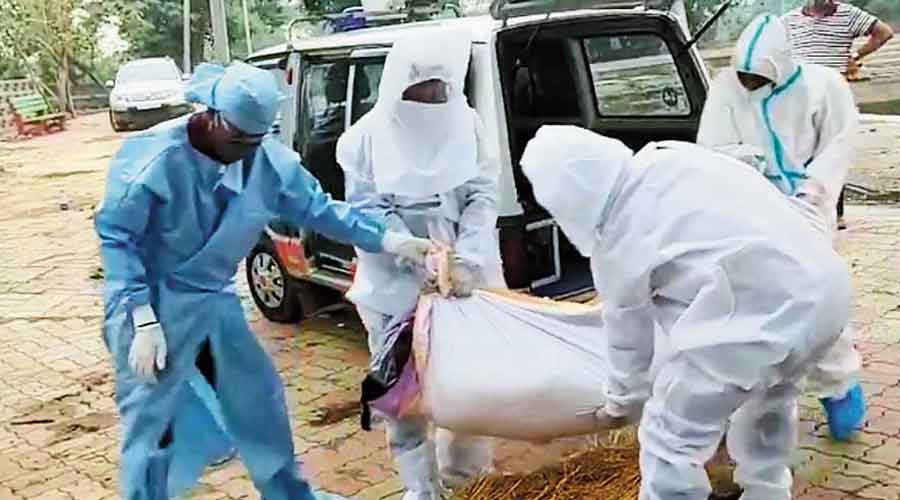The Centre on Thursday submitted in the Supreme Court a set of guidelines on eligibility for the ex gratia of Rs 50,000 pledged to the family of each Covid dead, including among the beneficiaries the kin of those who died by suicide after testing positive.
In an affidavit, the Centre said the guidelines would be “binding” on all state governments and urged the apex court to make this point clear in its order. The ex gratia is to be paid from the state disaster relief funds.
The affidavit filed through the Union home ministry has fixed the following criteria to determine a Covid death:
⚫ Proof of diagnosis of Covid through an RT-PCR, rapid antigen or molecular test. Clinical determination of Covid through other investigations in a hospital or any other inpatient facility by the attending doctor will also be accepted.
⚫ A death certificate issued by a doctor in hospital or at home through Forms 4 and 4A, as required under Section 10 of the Registration of Birth and Death Act, 1969.
⚫ Deaths occurring within 30 days of testing positive for Covid or collection of samples that yield a positive result. It will be immaterial whether the death had taken place in hospital or at home or elsewhere.
⚫ Deaths occurring after 30 days of remaining in hospital or any other inpatient facility.
⚫ Review and rectifications will be allowed of certificates of death issued before the guidelines dated September 3, 2021, came into force. Fresh certificates issued after rectifications will also be accepted.
The central government affidavit states that the next of kin of the Covid dead will be at liberty to raise grievances before district-level committees that the states will have to set up for selection of beneficiaries. The families of those whose death certificates do not recognise Covid as the reason before the guidelines came into force but could now be identified as Covid deaths under the new rules will also be permitted to approach these committees.
“On such application, the district-level committee will examine the contemporaneous medical records of the deceased patient in light of the guidelines dated 3.09.2021, and if the district-level committee comes to the conclusion that the case of the applicant indeed falls within the parameters contemplated under the guidelines… then (it) would issue a fresh or corrected certificate for the deceased in accordance with the guidelines… certifying his death to be a Covid-related death eligible for financial/other assistance as provided by the central government/SDRF,” the affidavit says.
The committees will have the power to look into disputes between a hospital and a family regarding the cause of death.
The government has made it clear that the Union home ministry and the Indian Council of Medical Research has clarified that all Covid-related death certificates issued before the guidelines came into force and those corrected or issued afresh after that will be considered as valid documents.
“Furthermore, in addition to the above, this Hon’ble court may also pass a mandamus directing all state governments/UTs to constitute the said committee within 30 days in the interest of justice,” the central government affidavit says.
According to the Centre, “all the state governments are respondents in the present petition and the guidelines have been framed in pursuance” of the apex court’s directions. “Hence, it is binding on state governments to implement it.”










